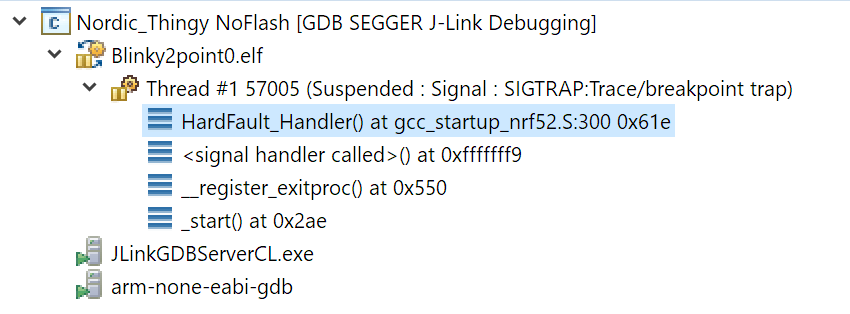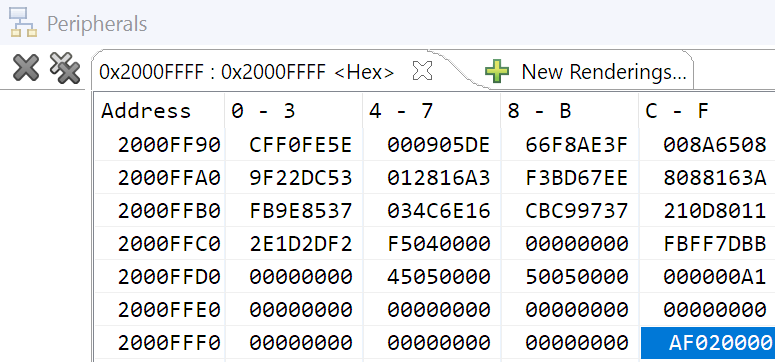Hi guys,
I'm trying to start with a simple IO toggle program on the nRF52 on a Thingy52 board. I have erased the micro so there is no soft device. I'm working in Eclipse Neon 3 using ARM Cross Compiler plugin.
#include "nrf.h"
#include "nrf_delay.h"
#include "nrf_gpio.h"
int main(void)
{
nrf_gpio_cfg_output(2);
for(;;)
{
nrf_gpio_pin_toggle(2);
nrf_delay_ms(50);
}
return 0;
}
I can compile and run it OK with my Segger JLink connected. However when I turn it off/on without the debugger running the micro hangs and does not toggle. Reconnecting the debugger shows it's in HardFault_Handler and it got there via the sequence:

Others have suggested to disable semi-hosting which I believe I have done.
My compilation flags (excluding #include search folders) looks like:
arm-none-eabi-gcc -mcpu=cortex-m4 -mthumb -mlittle-endian -mfloat-abi=hard -mfpu=fpv4-sp-d16 -munaligned-access -O0 -fmessage-length=0 -ffunction-sections -fdata-sections -fno-builtin -Wall -Wextra -g -DNRF52832_XXAA -DNRF52_PAN_12 -DNRF52_PAN_15 -DNRF52_PAN_20 -DNRF52_PAN_31 -DNRF52_PAN_36 -DNRF52_PAN_51 -DNRF52_PAN_54 -DNRF52_PAN_55 -DNRF52_PAN_58 -DNRF52_PAN_64 -DNRF52_PAN_74 -std=gnu11 -Wa,-adhlns="src/src_nrf/nrf_drv_uart.o.lst" -fno-strict-aliasing -fshort-enums -MMD -MP -MF"src/main.d" -MT"src/main.o" -c -o "src/main.o" "../src/main.c"
My linker script (mostly a copy of the generic one):
/* Linker script to configure memory regions. */
SEARCH_DIR(.)
GROUP(-lgcc -lc -lnosys)
MEMORY
{
FLASH (rx) : ORIGIN = 0x0, LENGTH = 512K
RAM (rwx) : ORIGIN = 0x20000000, LENGTH = 64K
}
SECTIONS
{
.fs_data :
{
PROVIDE(__start_fs_data = .);
KEEP(*(.fs_data))
PROVIDE(__stop_fs_data = .);
} > RAM
} INSERT AFTER .data;
SECTIONS
{
.pwr_mgmt_data :
{
PROVIDE(__start_pwr_mgmt_data = .);
KEEP(*(SORT(.pwr_mgmt_data*)))
PROVIDE(__stop_pwr_mgmt_data = .);
} > FLASH
} INSERT AFTER .text
OUTPUT_FORMAT ("elf32-littlearm", "elf32-bigarm", "elf32-littlearm")
/* Linker script to place sections and symbol values. Should be used together
* with other linker script that defines memory regions FLASH and RAM.
* It references following symbols, which must be defined in code:
* Reset_Handler : Entry of reset handler
*
* It defines following symbols, which code can use without definition:
* __exidx_start
* __exidx_end
* __etext
* __data_start__
* __preinit_array_start
* __preinit_array_end
* __init_array_start
* __init_array_end
* __fini_array_start
* __fini_array_end
* __data_end__
* __bss_start__
* __bss_end__
* __end__
* end
* __HeapBase
* __HeapLimit
* __StackLimit
* __StackTop
* __stack
*/
ENTRY(Reset_Handler)
SECTIONS
{
.text :
{
KEEP(*(.isr_vector))
*(.text*)
KEEP(*(.init))
KEEP(*(.fini))
/* .ctors */
*crtbegin.o(.ctors)
*crtbegin?.o(.ctors)
*(EXCLUDE_FILE(*crtend?.o *crtend.o) .ctors)
*(SORT(.ctors.*))
*(.ctors)
/* .dtors */
*crtbegin.o(.dtors)
*crtbegin?.o(.dtors)
*(EXCLUDE_FILE(*crtend?.o *crtend.o) .dtors)
*(SORT(.dtors.*))
*(.dtors)
*(.rodata*)
KEEP(*(.eh_frame*))
} > FLASH
.ARM.extab :
{
*(.ARM.extab* .gnu.linkonce.armextab.*)
} > FLASH
__exidx_start = .;
.ARM.exidx :
{
*(.ARM.exidx* .gnu.linkonce.armexidx.*)
} > FLASH
__exidx_end = .;
__etext = .;
.data : AT (__etext)
{
__data_start__ = .;
*(vtable)
*(.data*)
. = ALIGN(4);
/* preinit data */
PROVIDE_HIDDEN (__preinit_array_start = .);
KEEP(*(.preinit_array))
PROVIDE_HIDDEN (__preinit_array_end = .);
. = ALIGN(4);
/* init data */
PROVIDE_HIDDEN (__init_array_start = .);
KEEP(*(SORT(.init_array.*)))
KEEP(*(.init_array))
PROVIDE_HIDDEN (__init_array_end = .);
. = ALIGN(4);
/* finit data */
PROVIDE_HIDDEN (__fini_array_start = .);
KEEP(*(SORT(.fini_array.*)))
KEEP(*(.fini_array))
PROVIDE_HIDDEN (__fini_array_end = .);
KEEP(*(.jcr*))
. = ALIGN(4);
/* All data end */
__data_end__ = .;
} > RAM
.bss :
{
. = ALIGN(4);
__bss_start__ = .;
*(.bss*)
*(COMMON)
. = ALIGN(4);
__bss_end__ = .;
} > RAM
.heap (COPY):
{
__HeapBase = .;
__end__ = .;
PROVIDE(end = .);
KEEP(*(.heap*))
__HeapLimit = .;
} > RAM
/* .stack_dummy section doesn't contains any symbols. It is only
* used for linker to calculate size of stack sections, and assign
* values to stack symbols later */
.stack_dummy (COPY):
{
KEEP(*(.stack*))
} > RAM
/* Set stack top to end of RAM, and stack limit move down by
* size of stack_dummy section */
__StackTop = ORIGIN(RAM) + LENGTH(RAM);
__StackLimit = __StackTop - SIZEOF(.stack_dummy);
PROVIDE(__stack = __StackTop);
/* Check if data + heap + stack exceeds RAM limit */
ASSERT(__StackLimit >= __HeapLimit, "region RAM overflowed with stack")
}
My linker call looks like:
arm-none-eabi-gcc -mcpu=cortex-m4 -mthumb -mlittle-endian -mfloat-abi=hard -mfpu=fpv4-sp-d16 -munaligned-access -O0 -fmessage-length=0 -ffunction-sections -fdata-sections -fno-builtin -Wall -Wextra -g -T "D:\nRF_Workspace_Neon3\Blinky2point0/linker/blinky_gcc_nrf52.ld" -Xlinker --gc-sections -Wl,-Map,"Blinky2point0.map" -Wl,--start-group -lgcc -lc -lc -lm -Wl,--end-group -o "Blinky2point0.elf" ./src/src_nrf/gcc_startup_nrf52.o ./src/src_nrf/nrf_assert.o ./src/src_nrf/nrf_drv_common.o ./src/src_nrf/system_nrf52.o ./src/main.o
Stack region of memory:

Can anyone please point me in the right direction?


